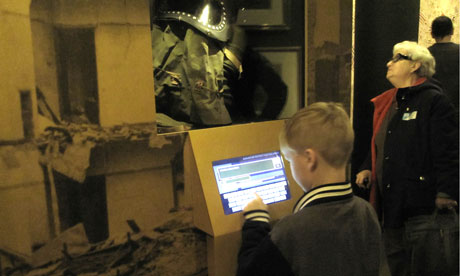In class last week I was very interested in Andrew’s discussion
of the ways through which the physiology of books can aid or detract from the
learning process. He mentioned that there is a difference between learning when
it is done through the medium of a physical book, versus through an online
text. He seemed to be against using tablets and eReaders for learning because
the medium, especially the light emitted from the screen, is not conductive to
learning.
I am very interested in whether tablets are an effective way
through which to disseminate information in an exhibit, and if they support
learning in museums. The use of new technology, like tablets, in museums is a
bit of a hot topic right now within the professional and academic museum communities.
Most of the discussion revolves around how to use new technology to enhance the
learning, and overall experience, of visitors within a museum/exhibit.
Andrew’s talk has made me interested in whether or not there is
any research that discusses how the use of tablets within museum exhibits might
detract from the visitors’ experience and learning. How do tablet screens affect learning and
memory in museums? This might be an interesting topic to research for my final
paper!

Hey Sarah, that sounds like an awesome topic for your final paper. I'm really interested in the subject too. Professor Dube here at the iSchool is also interested in this topic. Check out the link at the bottom. Basically, it deals with how children's cognitive capacity processes information on a tablet. It begs the question, is there a place for tablets in schools? I believe the research began in September. Before the school year started, they were calling for research assistants to go into schools to work with kids and document children's interaction with this kind of technology. The second link below is on Adam Dube if you aren't familiar with him or his work.
ReplyDeletehttp://semaphore.utoronto.ca/semaphore-colloquium-series-quantifying-childrens-intuitive-interactions-with-tablet-computers/
http://semaphore.utoronto.ca/adam-dube/
Hey Kevin! Sorry I didn't get back to you earlier, its been a rough month! Thank you for these links. I switched my topic a bit to look at publishing in museums, but since that is also leaning towards online publishing and the dual use of tablets as interactive elements within exhibitions these sources are still very useful!
DeleteHi Sarah and Kevin,
ReplyDeleteI aslo came to comment on the work of Dubé and iSchool professor Ronda McEwen.
Also, I wanted to drop some of my anecdotal experience that might possibly make me a weird outlier. But since my first family computer in the mid-nineties I have preferred reading and working on computers along with computer screens. I can remember refusing to hand-write essays in high-school because I simply think better in front of a screen and keyboard. I used to write up my chemistry lab reports in MS Word complete with chemical symbols. Now with the advent of the Kindle I could not be happier, and I have to say that my reading volume has increased simply by owning one.
Now don't get the wrong idea, I love reading paper books too! However, I really doubt that I learn any differently from a paper page, or illuminated screen. In fact, I think the people studying this idea need to be very careful about the conclusions they draw. If a person has been learning off of a paper page most of their life, and then you throw an iPad in front of them for half an hour and go on to conclude that they read faster on paper, the research is heavily biased. In the old old days when students learned off of slate and chalk at their desk, I wonder if paper notebooks were claimed to be unsuitable for learning?
I think that this is a great topic for your final paper, especially with through the lens of the museum. Awesome idea!
Thank you for your comment!
DeleteI had not considered that particular bias in research! While I have switched topics a bit, I am still focusing on the possible uses of tablets in publishing within museums. I agree its very important to consider the inherent biases researchers might have concerning the implication of tablet use within museums. Especially since many large museums where this type of research is done are slow moving and generally dislike change!